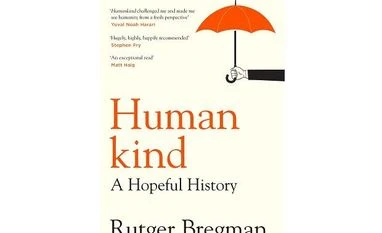Here’s a book that argues that we humans, deep down, are actually pretty decent beings. The timing couldn’t have been more bizarre — it was released in the middle of a global pandemic that has resulted in humanitarian crises, widespread protests in the US against systemic racism, the omnipresent threat of new consequences of climate change and border conflicts back home.
Written by Dutch historian Rutger Bregman, Humankind argues that we’ve been trained to be more biased towards the innate “evil” character in humans. He reasons that the “goodness” in humans has been deliberately ignored for ages and if we start recognising it as the more defining characteristic of human beings then we would be laying the grounds not only for a fundamental change in the way we engage with and imagine the world, but also for a new radical form of politics.
Mr Bregman certainly sets himself up for a herculean task. To say that, we, as a species, are basically nice is to rally in the defence of a lost cause. All you need to do to counter the argument is to simply scroll through your Twitter feed.
But this, precisely, is the problem, he argues. Media outlets are inherently biased towards magnifying the exceptional “rotten apples” while ignoring “mundane” realities.
Mr Bregman uses social science experiments to make his point.
Humankind: A Hopeful History
Author: Rutger Bregman
Publisher: Bloomsbury
Pages: 481
Price: Rs 699
As an example, he picks the Stanford Prison experiment which shows that students playing the role of guards in a make-believe prison invariably resort to sadistic techniques to torture inmates. The experiment is a classic example that depicts how “normal” human beings can turn inhuman. Careful analysis of the experiment, however, shows that the guards were actually pushed towards acting in a particular way and one prisoner deliberately put on a show.
Mr Bregman points to a BBC show, The Experiment, that replicated the experiment. Millions tuned in for the first episode, expecting sadistic drama on screen. Instead, the guards and the prisoners got along really well, some prisoners even escaped from their cell and smoked with the guards and soon enough, a mini-democracy formed.
What went wrong? The participants were not directed to act in any particular way, says Mr Bregman. The show was a disaster and was pulled off air shortly after.
Mr Bregman places one case study after another under a fine tooth comb to reveal how famous experiments were skewed to validate our cynical view of humankind and how data is manipulated for the headlines. When scepticism over the original study and counter studies emerge, they rarely get the same traction no matter how solid the evidence underlying the research is.
William Golding’s Lord of the Flies also comes under scrutiny. The legendary story of a group of English schoolboys who are left stranded on an island and soon descend into savagery for survival won the Nobel Prize for Literature. Mr Bregman hunts down an actual group of people who were stranded on an island as kids to figure out how close to reality Golding’s fiction is. Turns out, it’s the exact opposite, but this would be dismissed as a “feel-good” story.
Human beings, Mr Bregman argues, are “Homo Puppies”. They have grown friendlier and more “domesticated” over time since that guarantees survival. An evil nature, on the other hand, does not.
A major obstacle for anyone trying to say we’re good is obviously the Nazi regime. But Mr Bregman does not shy away from discussing Auschwitz. He says, “Auschwitz was the culmination of a long and complex historical process in which the voltage was upped step by step and evil was more convincingly passed on as good.”
He also undertakes long historical journeys to discuss the evolution of Homo Puppy. From political decisions to policing policies, our societies are built in ways that reflect our underlying distrust of our own character. Here enters the concept of nocebo — the opposite of placebo — which argues that this distrust acts as a self-fulfilling prophecy. Institutions that appeal to the good in us perform better. He points at schools that allow more autonomy for students or more humane prisons as examples.
The book plays out like a perpetual debate between two philosophers: “Whenever an idealist advocates more freedom and equality, Rousseau beams down approvingly. Whenever the cynic grumbles that this will only spark more violence, Hobbes nods in agreement,” he says.
A major shortcoming is that it mostly discusses public events. Humans are believed to be evil in the private sphere, too. Child sexual abuse is one example. The book is mute on these crimes.
However, there’s a powerful case to be made here. The book can act as a placebo or an effective challenge to our perception. There’s a good reason for that to happen, as Mr Bregman notes: “If you believe that people are essentially good, you have to question why evil exists at all. It implies that engagement and resistance are worthwhile, and it imposes an obligation to act.”
Unlock 30+ premium stories daily hand-picked by our editors, across devices on browser and app.
Pick your 5 favourite companies, get a daily email with all news updates on them.
Full access to our intuitive epaper - clip, save, share articles from any device; newspaper archives from 2006.
Preferential invites to Business Standard events.
Curated newsletters on markets, personal finance, policy & politics, start-ups, technology, and more.
)